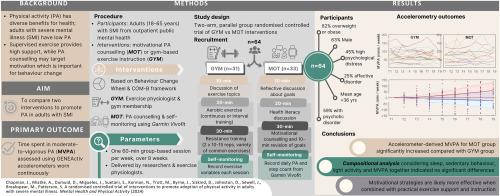促进患有严重精神疾病的成年人参加体育锻炼的干预措施随机对照试验
IF 2.6
3区 医学
Q2 PSYCHIATRY
引用次数: 0
摘要
背景和目的与普通人群相比,患有严重精神疾病(SMI)的成年人的体力活动量(PA)较低。有监督的运动干预措施能提供较高的支持,但可能无法有效提高动机,而动机对于行为改变非常重要。激励策略(如体育锻炼咨询)可能更直接地针对激励;但对 SMI 患者的效果尚不清楚。参与者被随机分配到:(1) 督导锻炼(GYM),或 (2) 激励咨询和使用健身追踪器进行自我监控(MOT)。小组课程为每周一次,为期 8 周。主要结果是使用连续佩戴的 GENEActiv 加速计评估中度到剧烈运动(MVPA)所花费的时间。MVPA 的变化采用与基线相比的累积变化以及轻度活动、久坐行为和睡眠的构成进行评估。从基线到干预后,加速度计得出的MVPA在MOT组有所增加,MOT组MVPA从基线到干预后的累积变化总和高于GYM组。结论MOT组的MVPA累积变化高于GYM组;然而,将MVPA视为其他日常行为的组成的组成分析表明,干预期间的组成没有变化。运动干预措施应包括激励策略和有监督的运动;未来的研究应调查持续时间更长、次数更多的行为改变干预措施。注册详细信息该试验已在澳大利亚和新西兰临床试验注册中心注册(ACTRN12617001017314)。本文章由计算机程序翻译,如有差异,请以英文原文为准。

A randomised controlled trial of interventions to promote adoption of physical activity in adults with severe mental illness
Background and aims
Adults with severe mental illness (SMI) have lower physical activity (PA) than the general population. Supervised exercise interventions provide high support but may not effectively promote motivation, which is important for behaviour change. Motivational strategies such as PA counselling may target motivation more directly; however, the effectiveness in people with SMI is unclear.
Methods
This was a randomised controlled trial of interventions designed to promote PA in adults with SMI. Participants were randomised to either: (1) supervised exercise (GYM), or (2) motivational counselling and self-monitoring using fitness trackers (MOT). Group sessions were once/week over 8-weeks. The primary outcome was time spent in moderate-to-vigorous PA (MVPA) assessed using GENEActiv accelerometers worn continuously. Change in MVPA was assessed using the cumulative change from baseline, and as a composition of light activity, sedentary behaviour, and sleep.
Results
Sixty-four participants were allocated (63% male, 82% overweight/obese, 59% psychotic disorder). Accelerometer-derived MVPA increased for the MOT group between baseline and post-intervention, and the cumulative sum of change in MVPA from baseline in the MOT group was higher than the GYM group. Compositional analyses showed stable weekly activity profiles, with no significant changes attributable to group allocation.
Conclusions
The cumulative change in MVPA was higher for MOT than GYM; however, compositional analyses that considers MVPA as a composition of other daily behaviours showed no change in composition over the intervention period. Exercise interventions should incorporate motivational strategies and supervised exercise; future research should investigate behaviour change interventions with longer durations and more frequent sessions.
Registration details
The trial is registered under the Australian and New Zealand Clinical Trial Registry (ACTRN12617001017314).
求助全文
通过发布文献求助,成功后即可免费获取论文全文。
去求助
来源期刊

Mental Health and Physical Activity
PSYCHIATRY-
CiteScore
6.70
自引率
6.40%
发文量
43
审稿时长
32 days
期刊介绍:
The aims of Mental Health and Physical Activity will be: (1) to foster the inter-disciplinary development and understanding of the mental health and physical activity field; (2) to develop research designs and methods to advance our understanding; (3) to promote the publication of high quality research on the effects of physical activity (interventions and a single session) on a wide range of dimensions of mental health and psychological well-being (eg, depression, anxiety and stress responses, mood, cognitive functioning and neurological disorders, such as dementia, self-esteem and related constructs, psychological aspects of quality of life among people with physical and mental illness, sleep, addictive disorders, eating disorders), from both efficacy and effectiveness trials;
 求助内容:
求助内容: 应助结果提醒方式:
应助结果提醒方式:


